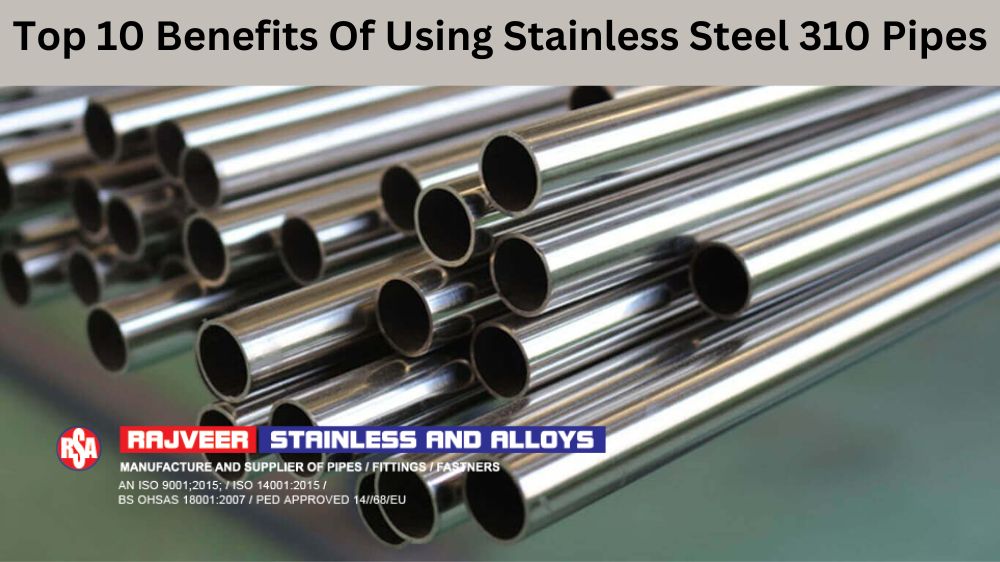When it comes to industrial piping systems, the choice of material is crucial for ensuring long-term performance and reliability. Among the many options available, stainless steel 310 pipes have emerged as a top contender due to their exceptional properties. This article will explore the key advantages that make stainless steel 310 an ideal choice for a wide range of industrial applications.
What Are Stainless Steel 310 Pipes?
Stainless Steel 310 Pipes are manufactured from AISI 310, a high-performance alloy known for its outstanding resistance to heat, corrosion, and oxidation. These pipes are widely used in industries such as chemical processing, food production, and energy generation because of their strength, durability, and ability to perform under extreme conditions. Their excellent weldability and machinability also make them easy to integrate into complex systems. Whether used in structural components or fluid transport, these pipes offer a reliable and efficient solution for demanding environments.
High-Temperature Resistance
One of the most notable features of stainless steel 310 is its ability to withstand extremely high temperatures—up to 1100°C. This makes it ideal for use in furnaces, heat exchangers, and other high-temperature equipment where conventional materials would degrade or fail. Its superior oxidation resistance ensures long-term stability even in harsh thermal environments.
Corrosion Resistance
Stainless steel 310 is highly resistant to corrosion, making it suitable for use in aggressive chemical environments. It can endure exposure to acids, alkalis, and other corrosive substances commonly found in chemical plants and refineries. This property not only extends the lifespan of the pipes but also reduces maintenance costs over time.
Excellent Strength and Durability
These pipes are known for their high tensile strength and ability to maintain structural integrity under pressure. They are particularly well-suited for pipelines that transport gases or liquids at high pressures without the risk of cracking or deformation.
Low Maintenance Requirements
Due to their resistance to wear and tear, stainless steel 310 pipes require minimal maintenance. This leads to less downtime and lower repair expenses, which is a major advantage for industrial operations looking to optimize efficiency.
Hygienic and Easy to Clean
The smooth surface of stainless steel 310 pipes makes them easy to clean and sanitize. This feature is especially important in food and beverage processing, where hygiene standards must be strictly maintained.
Cost-Effective in the Long Run
While the initial cost of stainless steel 310 pipes may be higher than some alternatives, their longevity and low maintenance needs make them a cost-effective option over time. The return on investment is significant, especially in critical applications where failure is not an option.
Aesthetic Appeal
With their sleek and polished finish, stainless steel 310 pipes add a modern and professional look to any installation. This makes them a popular choice in both industrial and architectural settings.
Good Weldability
These pipes are easy to weld using various techniques, which simplifies installation and allows for flexible design options. This adaptability is a big plus for engineers and contractors working on complex projects.
Resistance to Scale and Slag Build-Up
Stainless steel 310 has a low tendency to accumulate scale or slag, which is a major benefit in industries like power generation and steel manufacturing. This helps maintain system efficiency and reduce cleaning requirements.
Wide Range of Applications
From chemical and petrochemical plants to food processing and oil and gas facilities, stainless steel 310 pipes are versatile enough to meet the needs of multiple industries. Their adaptability and performance make them a go-to solution for diverse applications.
Conclusion
In summary, stainless steel 310 pipes offer a unique combination of heat resistance, corrosion protection, strength, and durability. They are a smart and practical choice for industries that demand reliable and long-lasting piping solutions. Whether you're looking to enhance system efficiency, reduce maintenance costs, or improve safety, stainless steel 310 pipes are a proven and effective option. Investing in these pipes is not just about meeting current needs—it's about building a sustainable and resilient infrastructure for the future.
